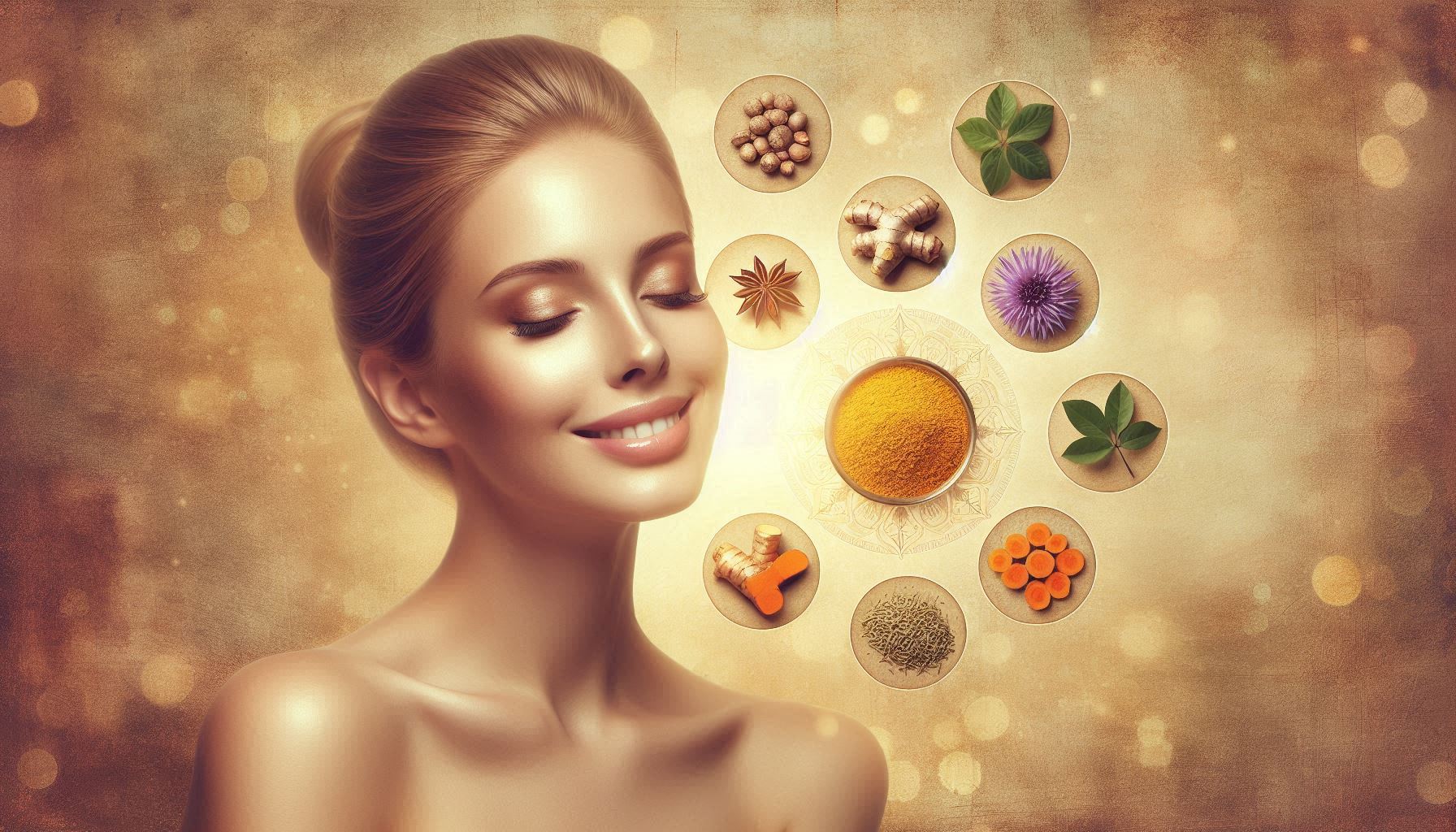Introduction
Ayurveda, an ancient system of natural healing originating in India, has been practiced for over 5,000 years. Its holistic approach focuses on balancing the mind, body, and spirit to achieve optimal health. One of the key areas where Ayurveda excels is skin care. Ayurvedic skin care emphasizes the use of natural, herbal remedies to promote glowing, healthy skin. In this article, we will explore the top 10 Ayurvedic herbs that can help you achieve radiant skin, and provide tips on how to incorporate these herbs into your daily routine.
Understanding Ayurvedic Skin Care
Ayurvedic skin care is based on the principle that true beauty comes from within. It focuses on using natural ingredients that work in harmony with your body to enhance your skin’s health. Ayurvedic herbs are known for their powerful healing properties and have been used for centuries to treat various skin conditions and improve overall skin health. These herbs help detoxify the skin, reduce inflammation, and promote cell regeneration, resulting in a natural, healthy glow.
Top 10 Ayurvedic Herbs for Glowing Skin
1. Turmeric (Curcuma longa) Turmeric is one of the most revered herbs in Ayurveda. It contains curcumin, a powerful antioxidant and anti-inflammatory compound that helps brighten the skin, reduce acne, and even out skin tone.
- Benefits for Skin Health: Brightens the complexion, fights acne, reduces inflammation.
- How to Use Turmeric: Mix turmeric powder with milk or yogurt to create a paste and apply it as a face mask. You can also add a pinch of turmeric to your daily diet for internal benefits.
2. Neem (Azadirachta indica) Neem is known for its antibacterial and antifungal properties. It helps in treating acne, eczema, and other skin infections, leaving the skin clear and healthy.
- Benefits for Clear Skin: Fights acne-causing bacteria, reduces skin infections, soothes irritated skin.
- Neem-Based Skincare Routines: Use neem oil or neem powder in face masks. Boil neem leaves in water and use the strained liquid as a toner.
3. Aloe Vera (Aloe barbadensis) Aloe Vera is a versatile herb that hydrates the skin, promotes healing, and reduces inflammation. It is ideal for soothing sunburns and treating dry skin.
- Benefits for Hydration and Skin Repair: Moisturizes the skin, heals wounds, reduces inflammation.
- Using Aloe Vera in Daily Skincare: Apply fresh aloe vera gel directly to the skin or use it as a base in DIY face masks.
4. Sandalwood (Santalum album) Sandalwood has cooling properties and is known for its ability to reduce redness and soothe irritated skin. It also helps in brightening the complexion and reducing scars.
- Benefits for Skin Radiance: Soothes irritation, brightens skin, reduces scars and blemishes.
- Sandalwood Face Packs: Mix sandalwood powder with rose water or milk to create a paste and apply it as a face mask.
5. Tulsi (Holy Basil) (Ocimum sanctum) Tulsi is a powerful herb with antibacterial and antifungal properties. It detoxifies the skin and helps in treating acne and other skin infections.
- Benefits for Detoxification and Skin Health: Detoxifies the skin, fights acne, soothes skin.
- Tulsi-Infused Skincare Remedies: Use tulsi leaves in face masks or make a tulsi-infused toner by boiling the leaves in water.
6. Amla (Indian Gooseberry) (Phyllanthus emblica) Amla is rich in vitamin C and antioxidants, making it an excellent herb for skin rejuvenation. It helps in collagen production and improves skin elasticity.
- Benefits for Skin Rejuvenation: Boosts collagen, improves skin elasticity, fights signs of aging.
- Incorporating Amla in Skincare: Use amla powder in face masks or consume amla juice for internal benefits.
7. Manjistha (Indian Madder) (Rubia cordifolia) Manjistha is known for its blood-purifying properties. It helps in treating skin conditions like acne, eczema, and rosacea, and promotes a clear complexion.
- Benefits for Skin Purification: Purifies blood, treats acne and eczema, promotes clear skin.
- Manjistha-Based Skincare Treatments: Use manjistha powder in face masks or consume it as a supplement.
8. Ashwagandha (Withania somnifera) Ashwagandha is a powerful adaptogen that helps in reducing stress and promoting skin vitality. It also has anti-aging properties and helps in improving skin tone.
- Benefits for Skin Vitality: Reduces stress, promotes skin vitality, has anti-aging properties.
- Ashwagandha Skincare Applications: Use ashwagandha powder in face masks or consume as a supplement for overall health benefits.
9. Licorice Root (Glycyrrhiza glabra) Licorice root is known for its skin brightening properties. It helps in reducing hyperpigmentation and dark spots, giving the skin a radiant glow.
- Benefits for Skin Brightening: Reduces hyperpigmentation, lightens dark spots, brightens skin.
- Licorice Root Skincare Products: Use licorice root extract in serums and face masks.
10. Saffron (Crocus sativus) Saffron is one of the most luxurious and effective herbs for enhancing skin tone. It helps in brightening the complexion and reducing blemishes.
- Benefits for Enhancing Skin Tone: Brightens complexion, reduces blemishes, gives a radiant glow.
- Saffron-Infused Beauty Treatments: Soak saffron strands in milk and apply the mixture to the face as a mask.
Best Practices for Using Ayurvedic Herbs
To get the best results from these Ayurvedic herbs, it is essential to use them consistently and correctly. Here are some tips for integrating these herbs into your daily skincare routine:
- Create DIY Face Masks: Use the powders of these herbs to create custom face masks tailored to your skin’s needs.
- Incorporate in Diet: Many of these herbs can be consumed as supplements or added to your diet for internal benefits.
- Use Herbal Oils: Ayurvedic oils infused with these herbs can be used for facial massages and skincare treatments.
- Be Consistent: Ayurvedic treatments are natural and may take time to show results. Consistency is key to achieving glowing skin.
Benefits of Ayurvedic Skin Care
Ayurvedic skin care offers numerous benefits compared to conventional skincare products. By using natural ingredients, you avoid harmful chemicals and synthetic compounds that can damage your skin over time. Ayurvedic herbs work harmoniously with your body’s natural processes, promoting holistic health and long-lasting beauty. These natural remedies not only treat the symptoms but also address the root causes of skin issues, leading to healthier, more radiant skin.
Conclusion
Incorporating Ayurvedic herbs into your skincare routine can transform your skin and give you a natural, healthy glow. The top 10 Ayurvedic herbs—turmeric, neem, aloe vera, sandalwood, tulsi, amla, manjistha, ashwagandha, licorice root, and saffron—each offer unique benefits that cater to different skin needs. By understanding and utilizing these herbs, you can create a personalized skincare regimen that promotes glowing, healthy skin. Embrace the wisdom of Ayurveda and experience the beauty of natural, radiant skin.
For more tips and Ayurvedic products, visit Yashaayu Ayurveda and start your journey towards holistic skincare today.





